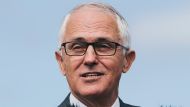Associate Professor Theresa Jacques is a pioneering intensive care specialist. She's the director of a major ICU. She's tough, passionate, incisive, and if your loved one needs life-saving medical treatment she's someone you'll want to have around.
So why would her male colleagues ever have thought it was appropriate to tell her to fetch their tea and sandwiches?
More National News Videos
Apology over 'toxic culture' among surgeons
October 10, 2015: After a survey finds nearly half of all surgeons have experienced discrimination, bullying or sexual harassment, RACS President apologises for the 'devastating impact' on surgeons and trainees.
"It's the classic anecdote you'll hear from female intensivists," Professor Jacques said, who copped her fair share of sexism as she rose through the ranks almost 20 years ago.
"We're talking about senior medical officers. Qualified doctors tasked with taking lunch orders and told to perform menial, secretarial tasks."

The legacy of bullying and harassment Professor Jacques experienced has bled into the latest generation of young doctors.
At the last Women in Medicine dinner in December – an organisation Professor Jacques co-founded – three female interns said they were so beaten down by gender bias and bullying that they were considering giving up their specialist training.
"The younger generation are still exposed to this behaviour. Unconscious bias is rife, I've found in my experience supporting young women in this profession," Professor Jacques said.
"They're being physically intimidated. Females short in stature will tell you male colleagues have stood over them and raised their voice. They're getting yelled at by senior colleagues under pressure."

The College of Intensive Care and Medicine (CICM) – prompted by media coverage of widespread discrimination and sexual harassment among surgeons and anecdotal reports within its own ranks – has moved to stamp out bullying, discrimination and harassment in ICUs.
The college surveyed almost 1000 fellows and trainees and found one third reported being bullied in the past two years.
The findings were "very distressing", Professor Jacques said.
A total of 12 per cent report they had experienced discrimination and 3 per cent reporting being sexually harassed.
Women were almost three times more likely to be sexually harassed than men and more than twice as likely to report discrimination, according to the survey published in Critical Care and Resuscitation.
When the findings were presented at the CICM's recent scientific meeting, a male attendee stood up and announced the incidence of sexual harassment was not statistically significant, Professor Jacques said.
"It's not about statistics. No [degree of] incidence of sexual harassment is acceptable," Professor Jacques said.
The survey also found doctors who got their primary medical qualifications in Asia or Africa were at greater risk of discrimination, and junior doctors were not the only targets. Both trainees and fellows reported experiencing bullying, discrimination and sexual harassment.
CICM president Associate Professor Charlie Corke said the findings were disturbing, if not surprising.
International surveys covering several medical specialties have reported bullying and harassment prevalence ranging from 30 per cent to 89 per cent.
"We knew we had to address this head-on. We couldn't just sit back and pretend it was someone else's problem," he said.
The college has developed a policy for responding to bullying complaints. Intensive care trainees will also be invited to provide confidential feedback, and surveyed every six months, which will specifically address whether they have witnessed bullying during their training.
"We'll be looking for patterns of behaviour," Professor Corke said.
The college, which is a training centre and accredits ICUs, has included bullying and harassment assessments as part of the accreditation process. Any ICU that fails to protect its staff and trainees risks losing its accreditation.
The high stakes, high stress environment meant ICU doctors were under a great deal of pressure, "but there was no excuse to act out," Professor Corke said.
"We need there to be no ambiguity. The college has a zero tolerance policy concerning bullying and harassment. We need to change the culture in medicine," he said.
The college has also set up a welfare group to address bullying, discrimination and harassment within the discipline.
The survey results were "likely to be tip of the iceberg stuff," Professor Jacques said.
The college would need to address underlying ingrained gender discrimination; demeaning comments, women snubbed for speaking roles at scientific meetings, and feeling the need to list male names first on grant applications to secure funds, she said.
There was a significant gender imbalance in Australia's ICUs. Women accounted for just 16.6 per cent of intensive care specialists and 35.6 per cent of trainees, according the the AIHW.
Women make up just 10.5 per cent of ICU Clinical Directors in Australia and New Zealand.
Professor Jacques supported introducing gender quotas in ICUs.
"It's controversial but without proactively promoting and sponsoring women in the clinical workplace it is going to take years, perhaps centuries to get anywhere near equity," she said.
Passionate leadership over time would be critical to the college's success, Professor Jacques said.
"We're going to need male champions," she added. "Women can't address this alone."















